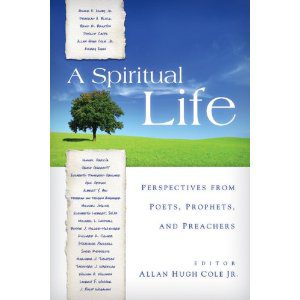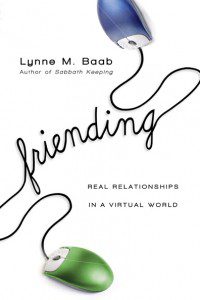 “An editor has an eschatological hopefulness that in the end a manuscript can become much more than it presently is; that it can find fulfillment and fruition in new and unexpected ways.” –Al Hsu
“An editor has an eschatological hopefulness that in the end a manuscript can become much more than it presently is; that it can find fulfillment and fruition in new and unexpected ways.” –Al Hsu
Al Hsu (pronounced “shee”) is an author (The Suburban Christian; Grieving a Suicide), a dad, a Ph.D. student, and an editor at InterVarsity Press. He’s also a longtime friend, so I was intrigued to see what he would contribute to Allan Cole’s new anthology A Spiritual Life. Today is the last Thursday of our May series of spirituality excerpts drawn from this book. (I’m assuming that you’ve enjoyed your teasers enough to go buy the book, which is available at a great discount at The Thoughtful Christian marketplace.)
In his essay, Al proposes a new metaphor for God: God is a professional editor. Now, don’t go assuming that this essay resonated with me only because I am a professional editor too, and that Al’s thesis means that my chosen career is divinely sanctioned. That’s an appealing little piece of narcissism, but . . . no. I loved this essay because it gave me a new model for thinking about God doing what I try to do every day for my authors–help them catch a vision of who they could be. –JKR
God as Divine Editor
By Albert Y. Hsu
One daily e-newsletter that I receive gives the etymologies of interesting words. One entry about “back-formation words” talked about words that are devised from what appears to be a derivative word. For example, the verb beg was actually derived from the noun beggar, and the noun injury preceded the verb form injure.
The verb edit is one of these back-formation words. The primary source word was the noun editor, from the Latin edere, “to give out.” That word came first. Only later was the verb edit derived from the preexisting editor.[1]
Knowing this says something to me about the primary identity of the editor. Even before an editor actually edits, he or she has an editorial identity apart from any utilitarian function of editing. An editor is predisposed to be shaping and honing material even before a particular manuscript or project comes across the editor’s desk.
This understanding of editing points to an innate quality of the editorial personality—namely, the yearning for redemption. An editor looks at projects with an eye to bringing the best out of what might be currently an unreadable mess. An editor has an optimistic desire to make things better. The editor sees latent potential and draws the best out of an author. The editor prompts the author toward revision, sometimes with gentle encouragement, sometimes with heavier editorial direction. An editor has an eschatological hopefulness that in the end a manuscript can become much more than it presently is; that it can find fulfillment and fruition in new and unexpected ways.
In some theological circles, narrative theology is done in such a way that God is presented as the sole author writing the story of human history. In this framework, God is a novelist who plots out every detail, and we humans are merely characters doing God’s will in the drama. While narrative has been a fruitful way of doing theology, in some oversimplified versions God scripts the plot in such a way that human agency is minimized or eliminated.[2]
I think it might be more helpful to think of God not as a novelist, but as an editor who shapes us as we write our lives. In this scenario, humans are not puppet actors, but collaborative authors working with an editor who sees the bigger picture. Author and editor work together in partnership to shape the trajectory of a book. The author is still fundamentally responsible for his or her own work, but the editor guides and directs the author to bring out the best in both the author and the text.
God is the divine Editor. Long before humanity came into being, God was already at work shaping the creation of the universe. God gave agency to humans to write and tell their own stories, setting the stage for narratives to be written and performed. And even in the midst of a fallen world, God has an editorial eye. God sees the tangled plotlines of damaged lives and yearns to bring redemption and resolution to them. Whether on an individual or a cosmic level, God collaborates with human actors to point them toward ultimate good.
This view retains the paradoxical balance of human responsibility and divine sovereignty. Some Christians are often too quick to move toward catch phrases and slogans like “It’s all about God” or “My life is in God’s hands,” as if we have no say whatsoever about how our lives unfold. On the other hand, other Christians are “practical deists,” living their lives as if God doesn’t exist at all.[3] One group says it’s all about God, and the other lives as if it’s all about us. But the reality is that humans and God live together in interactive partnership.
That is the paradoxical tension depicted in the author/editor relationship. Author and editor journey together on a shared pilgrimage. God might not be a novelist, but may well be an editor. Just as an editor commissions and acquires projects for development and publication, so too does God commission us to write our lives for the sake of others, editing us along the way.
[1] A.Word.A.Day e-newsletter, Anu Garg, April 26, 2010, http://wordsmith.org/words/cathect.html.
[2] See Bruce Reichenbach on why God is not a novelist in “God Limits His Power” in Predestination and Free Will: Four Views, ed. David Basinger and Randall Basinger, (Downers Grove, Ill.: InterVarsity Press, 1986).
[3] See Craig M. Gay, The Way of the (Modern) World: Or, Why It’s Tempting to Live As If God Doesn’t Exist (Grand Rapids, Mi.: Eerdmans Publishing Company, 1998).

